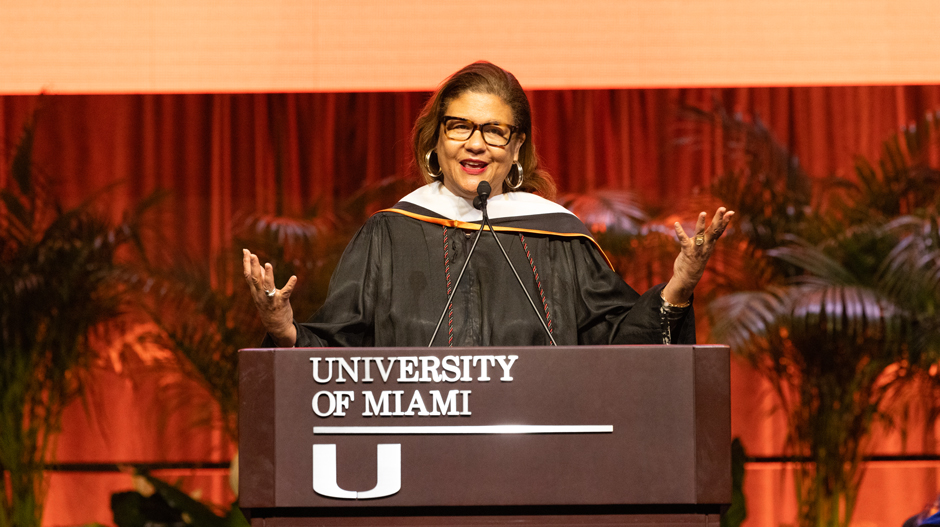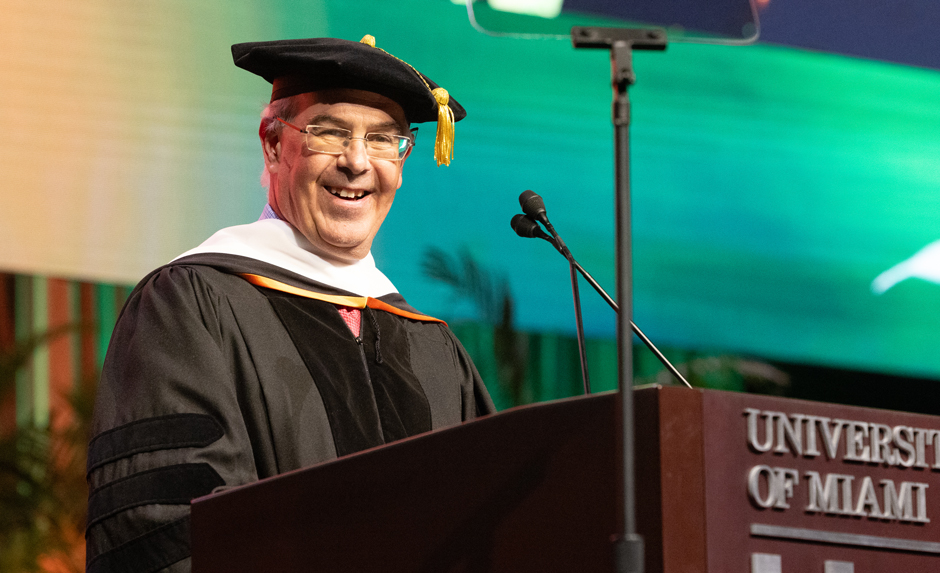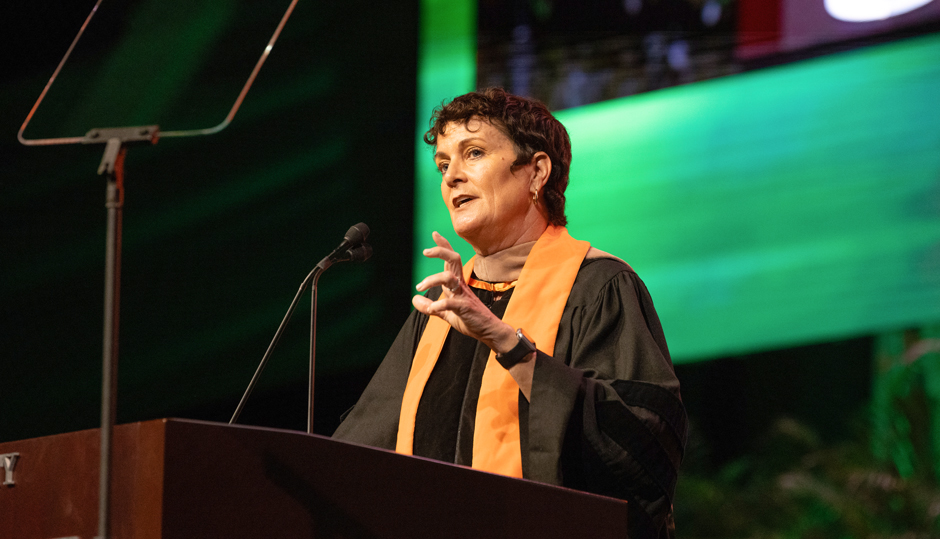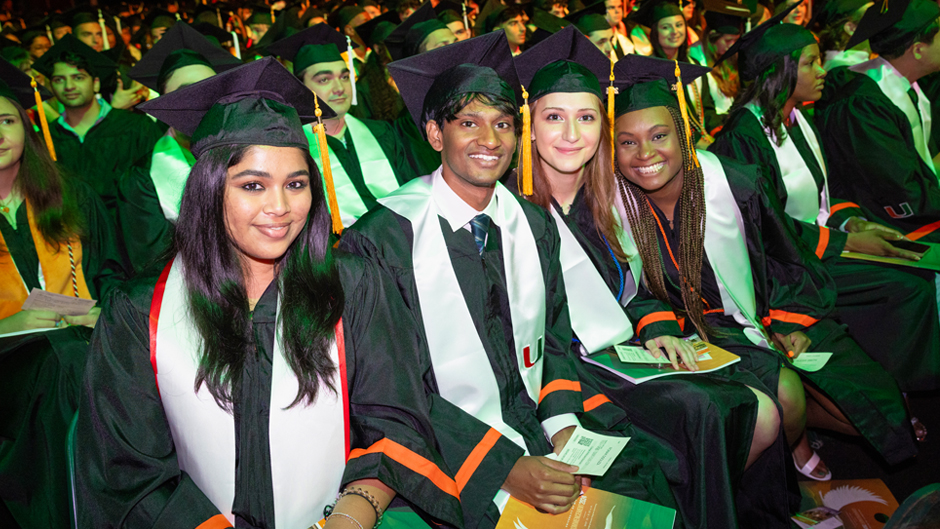Elizabeth Alexander, the president of the Mellon Foundation, the nation’s largest funder of the arts, addressed 766 new graduates of the University of Miami College of Arts and Sciences and Division of Continuing and International Education in the first of three undergraduate ceremonies on Friday.
Alexander applauded the graduates’ resilience to earn their degrees despite the unprecedented challenges prompted by the pandemic and the turbulent state of the world.
“What I hope for you and what I have faith you will do is to continue to show the courage you have already demonstrated,” Alexander said. “Be brave every day. Keep using your voices, keep stepping into your responsibilities, and keep exercising your leadership which we are waiting for.”
In the second address David Brooks, a New York Times columnist, author, and founder of a national initiative to foster inclusive civic leaders, noted that with their degrees now in hand, graduates are embarking on their “second education.”
“Your relationship to information changes. As a student you’re mostly receiving information,” Brooks said. “In the decades ahead, you also will have to create and present information. In school you had teachers to guide you through the world of knowledge. After school you have to become really good at being your own teacher.”
In the final ceremony of the day, Kimberly Stone, an alumna and chief executive officer of the National Women’s Soccer League’s Washington Spirit, shared her experience as a global leader in sports business and arena management, which includes a stint with the NBA’s Miami Heat organization.
She said that working in “the toy department of life”—the sports industry—has taught her a multitude of lessons she has taken to heart.

In the morning ceremony, Alexander noted that the immediate future with its “entrenched conflicts, new wars, climate emergency, and growing turmoil around books and academic courses” may seem complex and daunting.
Yet she reminded students that the University has established a strong precedent for embracing “great change and great challenges” and listed a range of historic achievements for fomenting racial and gender integration and creating new educational models, especially during the socially turbulent decades of the 1960s and 1970s.
“In that time of great change, the University of Miami’s response was not to turn away, in fear, from the great challenges before it, but to turn towards them, with openness,” Alexander said. “It was to bring in more people, try new ideas, give them more resources, and more broadly, and to open the doors, and then to open them wider.”
She urged new graduates to continue the tradition of building “not walls, but openings."
“And one of the tasks you will need to take up in the time to come is to make sure that others have access to the same kind of education that you were able to earn here, so that they, too, can do their part to contribute to—and meaningfully participate in—the future of our richly diverse American society,” Alexander said.
“Meeting this challenge will require of you your ingenuity, service, creativity, vision, and readiness,” she added.
It will require, too, that students build “your own, new communities, wherever and however you choose to work and live. And, crucially, it will require that you do your part to keep those communities strong.”
Alexander highlighted that the community of poetry and poets has been central to her life and recognized the first inaugural poet in the United States, Robert Frost, who began a long association with the University as a lecturer during the Great Depression.
She cited a pivotal line from Frost’s “Mending Wall” poem: “Something there is that doesn’t love a wall.”
“Whatever the communities are that you choose to create in the challenging future ahead, I ask you to remember the lessons of that earlier community here at this University, back in the 1960s and 1970s: ‘not fear, but openness,’” Alexander said.
“For inspiring generations of students and advocating for justice and understanding through the arts,” Alexander received Doctor of Humane Letters, honoris causa, from University President Julio Frenk.
Brooks, the New York Times columnist, addressed the largest audience of the day, 917 graduating students from the University of Miami School of Architecture, the School of Communication, the School of Education and Human Development, the Rosenstiel School of Marine, Atmospheric, and Earth Science, the Frost School of Music, and the School of Nursing and Health Studies.
Brooks urged students to remain curious and to become lifelong explorers.
“The older I get the more I conclude that the key trait in life is not intelligence, which you all have; it’s the hunger for wisdom,” Brooks said. “It’s the ability to just keep on learning up until the moment you die. When you apply for jobs at the really good workplaces, they will be less interested in what you know than in what you can learn tomorrow.”
Lifelong learning begins with curiosity, and curiosity is a form of love, Brooks said.
“When you love somebody, you want to know everything about them. When you’re curious about some subject you have an obsessive enthusiasm to understand,” he noted.
Life transitions such as the “second education” have a certain shape—an ending of something, time in the neutral zone, and then a new beginning, Brooks said.

“Many of you are about to enter the neutral zone. The next few years will involve a lot of wandering,” he said. “You’re going to drift around trying to figure out where you fit into this big world of ours, trying to figure out what you love spending time on. You’ll worry that you haven’t yet found your place.”
He encouraged students to be patient and kind to themselves during this time because deep down their minds are evolving to a new reality and a new consciousness is emerging. He urged them to be “explorers” of the world around them.
The veteran columnist said he hoped to persuade the new graduates that this “second education” that begins with their graduation would be even more fun than their first education.
“Human learning is not like machine learning. Human learning is nonlinear, emotional, hormonal, self-conscious, brave, embodied, curious, ambitious, and unpredictable,” he said. “AI will probably be the defining technology of your lives, but it will not replace you. AI will offer us a different kind of intelligence, but it won’t be our kind of intelligence. We will learn what makes us human by observing what AI can’t do.”
Frenk presented Brooks with an honorary Doctor of Humane Letters degree for “using your communication skills and your quest for illumination to inspire others to pursue purposeful lives.”
In the final ceremony, Stone—the Washington Spirit executive—shared with graduates of the Miami Herbert Business School and College of Engineering advice as they embark on what she called the “next chapter of your lives.”
“I’ve been lucky to work in what [Miami Heat team president] Pat Riley famously calls the toy department of life. And it’s been my privilege to navigate this exhilarating playground alongside some of the brightest stars and minds in the industry,” said Stone, who earned an M.B.A. from the University in 2003 and is now CEO of the Washington Spirit women’s professional soccer club.

“From the Miami Heat, where I spent 23 incredible years learning from luminaries like Riley, Dwyane Wade, LeBron James, and Eric Woolworth, to the Golden State Warriors, where I had the honor of working with Steph Curry, Steve Kerr, and Hall of Fame executive Rick Welts, each experience has enriched me with invaluable lessons in professionalism, grit, and determination. You’ll need a lot of that in life,” she told graduates.
Named a Woman of the Year by WISE—Women in Sports and Events—Stone began her storied career in the industry right out of college, working as a sports information assistant in the University’s Department of Athletics. During her commencement address, she recalled how during a preseason football media day she organized, a confident Hurricanes freshman lineman proclaimed to a group of reporters that it was his goal not to become an NFL player after his college football career ended but to make a name for himself as one of professional wrestling’s biggest stars.
“That was no average freshman,” Stone recalled of Dwayne “The Rock” Johnson, who would go on to become a World Wrestling Entertainment icon and movie star. “He knew at a young age what he wanted to do, and I’d say he has certainly surpassed even his loftiest aspirations.”
Stone imparted four nuggets of advice to graduates, first telling them to judge people by their actions, not their words. “In a world filled with noise and empty promises, it’s actions that truly speak volumes,” she said. “Look beyond the rhetoric and pay attention to what people do, for their deeds will reveal their character far more eloquently than any words ever could.”
Stone urged students to venture beyond their comfort zone. “It’s easy to settle into the familiar and the safe,” she said. “But growth and opportunity lie in venturing beyond the boundaries of what you know. Embrace challenges, embrace uncertainty, and embrace the discomfort that comes with pushing yourself to new heights.”
She challenged graduates to be decisive when placed in positions of leadership. “Leadership isn’t about waiting for permission or hoping someone else will step up—it’s about seizing the reins and guiding your team toward success,” Stone said.
And she encouraged the University’s newest alumni to pursue their passions, telling them that if they did so, work would never become dull and tiresome. “When you’re driven by passion, work ceases to be a chore; it becomes a labor of love, a journey of discovery and fulfillment,” Stone said. “Whether it’s engineering marvels or building businesses from the ground up, let your passion be the driving force behind everything you do.”
Stone told the Class of 2024 to “dare to dream, dare to lead, and dare to push the boundaries of what’s possible.”
Earlier in the day, student speakers shared their insights.
Alex Westover, a graduate of the Rosenstiel School of Marine, Atmospheric, and Earth Science, credited his professors for inspiring his “boundless enthusiasm to pursue the impossible.”
“You not only shared your knowledge with us—everything from the history of surfing to how not to titrate hydrogen chloride in a chemistry lab—you also shared your passions, pushing us to find our own and act upon them.
“Your education goes far beyond the classroom,” Westover continued. “You sent us into the real world with more than just textbooks, and we came back with experiences we would have never believed.”
Westover is believed to be the first “Sebastian” to offer a student commencement address. An hour before taking the podium, he astonished his parents by letting them know that he’d be giving the student address and also revealing his identity as the University’s mascot.
Westover, who along with other athletes will represent the United States in the World Triathlon Multisport Championships this August in Townsville, Australia, encouraged his graduating classmates to “be fearless.”
“The pursuit of the impossible is intoxicating. It drives us to be the best version of ourselves, to push boundaries, to chart new paths through the unknown,” Westover said.
Graduate speaker in the first ceremony, Adriana Ramirez, who earned a bachelor’s degree with a major in biology and minor in chemistry and psychology, acknowledged the sacrifices that her parents, who emigrated eight years ago from Cuba, made toward her education.
“It takes a village to survive, and it takes a village to accomplish great things,” said Ramirez, who was chief of staff to the student government president, football chair of Category 5, and a member the Latin Leadership Council, as part of her student involvement.
Ramirez especially celebrated her father who originally gave up his dental career to support the family when he came to the United States, then returned to college and in six days will receive his doctorate in dental science degree.

